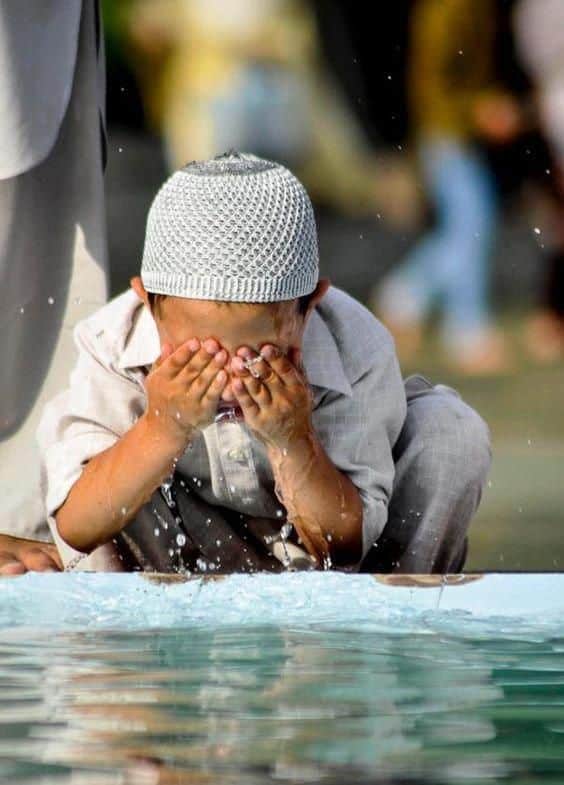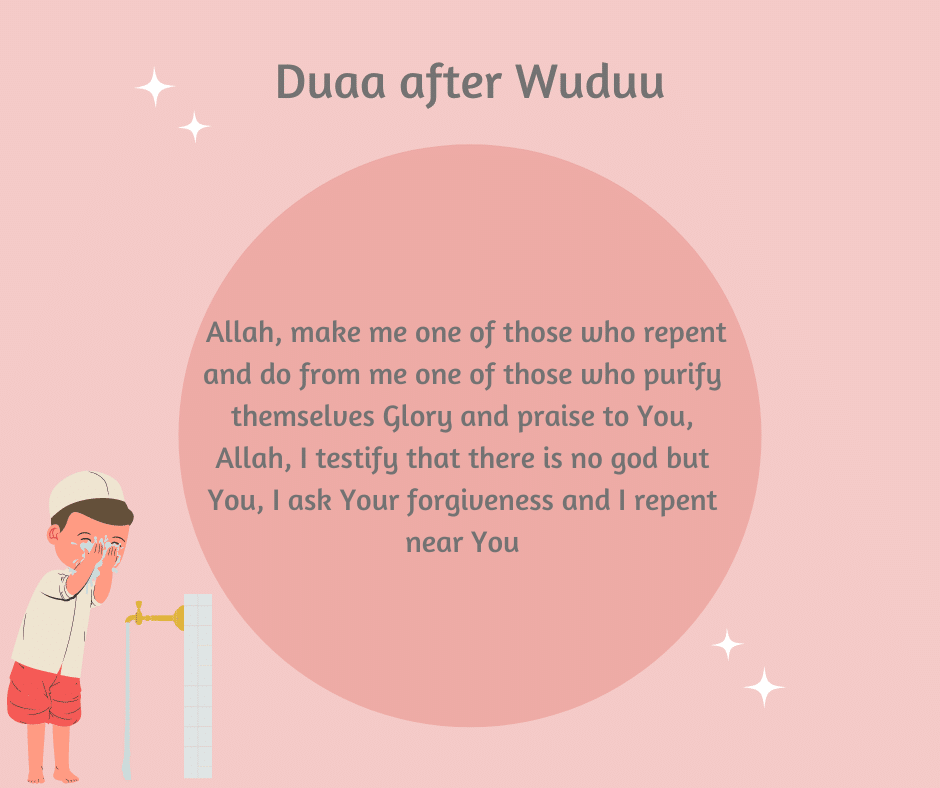Dua after Wudu
Praise be to Allah.
The Du’as to be said at the start of wudu and after finishing it were reported by the Prophet (peace and blessings of Allah be upon him).
Dua before wudu:
Regarding what needs to be said at the beginning, the only thing that was told is to mention the name of Allah when saying Bismillah (in the name of Allah).
Proof of this is the words of the Prophet (peace and blessings of Allah be upon him): “There is no wudu for one who does not mention the name of Allah in it. Reported by al-Tirmidhi, 25 years old.
He said: Regarding this matter, it has been reported by ‘Aishah, Abu Sa’id, Abu Hurayrah, Sahl ibn Sa’d and Anas. Ahmad ibn Hanbal said: I do not know of any hadith with a jayyid arenad on the subject. (Al-Tirmidhi). The hadith was classified as sahih by al-Albani in Sahih al-Tirmidhi.
Al-Nawawi reported in al-Majmu ‘(1/385) that al-Bayhaqi said: “The most solid record regarding saying Bismillah (for wudu) is the hadith of Anas, according to which the Prophet (peace and blessings of Allah be upon him) put his hand into the vessel of water and then he said: “Do wudu in the name of Allah. [Anas] said: I saw water gushing out from between his fingers, and people did wudu until the last of them did the wudu, and there were nearly seventy men.
His isnad is jayyid, and he was cited as proof by al-Bayhaqi in his book Ma’rifat al-Sunan wa’l-Athar; he classified the other ahadith as da’eef (weak)

Dua after Wudu:
Regarding what is said after wudu, a number of ahadith have been reported on this subject.
From the reports it can be concluded that he said: Ashhadu an la ilaha ill-allah wahdahu la sharika lah, wa ashhadu anna Muhammadan ‘abduhu wa rasuluhu. allahumm aj’alni min al-tawwabina waj’alni min al-mutatahhirina, subhanaka allahumma wa bi hamdika, ashhadu an la ilaha illa anta, astaghfiruka wa atubu ilayka
(I certify that there is no god but Allah Alone, without associate or associate, and I certify that Muhammad is His servant and Messenger. Allah, make me one of those who repent and do from me one of those who purify themselves Glory and praise to You, Allah, I testify that there is no god but You, I ask Your forgiveness and I repent near You).
Muslim (234) related from ‘Umar ibn al-Khattab (may Allah be pleased with him) that the Messenger of Allah (peace and blessings of Allah be upon him) said: well, then said, Ashhadu an la ilaha ill-Allah wahdahu la sharika lah, wa ashhadu anna Muhammadan ‘abduhu was rasuluhu is his slave and messenger) but the eight gates of paradise will be open to him and he will enter through whatever he wants. Reported by Muslim, 234.
Al-Tirmidhi (55) added: “allahumm aj’alni min al-tawwabeena waj’alni min al-mutatahhireena (O Allah, make me one of those who repent and make me one of those who purify themselves) . “
This addition was classified as da’if (weak) by al-Hafiz ibn Hajar (Allah have mercy on him), who said: This addition which is reported by al-Tirmidhi is not proven to be part of this hadith. End quote from al-Futuhat al-Rabbaniyyah, 2/19.
Al-Albani classified him as sahih in Sahih al-Tirmidhi. Ibn al-Qayyim stated in Zad al-Ma’ad that it is proven to come from the Prophet (peace and blessings of Allah be upon him).
Regarding the phrase “subhanaka allahumma wa bi hamdika, ashhadu an la ilaha illa anta, astaghfiruka wa atubu ilayka (Glory and praise to You, O Allah, I testify that there is no god but You, I ask Your forgiveness and I repent to you), this was reported by al-Nasai in ‘Aml al-Yawm wal-Laylah, and by al-Hakim in al-Mustadrak, from Abu Sa’id al-Khudri (which Allah be pleased with him).
Narrators differed as to whether the hadith could be attributed to the Prophet (peace and blessings of Allah be upon him) or whether it was the words of Abu Sa’id (may Allah be pleased with him).
Al-Hafiz Ibn Hajar (may Allah have mercy on him) said: “The isnad is undoubtedly sound, but rather they differed as to whether the text could be attributed to the Prophet (peace and blessings of Allah be upon him) or not (i.e. whether he ‘acted of marfu’ or mawquf).
Al-Nasai always rules on the basis of caution, which is why he was wrong. But according to al-Nawawi’s method, following Ibn al-Salah and others, it is more likely to be marfu ‘. (Al-Futuhat al-Rabbaniyyah, 02/21)
It has been classified as sahih by al-Albani in Sahih al-Targhib (225) and al-Silsilah al-Sahihah (2333). (See Tamam al-Minnah, pp. 94-98)
Dua during Wudu:
These are the du’as which were narrated by the Prophet (peace and blessings of Allah be upon him) to be said in the wudu. As for saying du’a when washing different parts of the body, nothing like this has been proven from the Prophet (peace and blessings of Allah be upon him).
Al-Nawawi said in al-Adhkar (p. 30): “As for the du’as which are said when washing various parts of the body in the wudu, no such thing was reported by the Prophet (peace and blessings of Allah be upon him).”
Ibn al-Qayyim said in Zad al-Ma’ad (1/195): “It is not reported from him that he used to say anything in his wudu other than saying Bismillah. Every hadith which speaks of du’as to be said in the wudu is false and fabricated.
The Messenger of Allah (peace and blessings of Allah be upon him) did not say any of these things and he did not teach them to his ummah. There is nothing reported from him except saying Bismillah at the beginning and saying Ashhadu an la ilaha ill-Allah wahdahu la sharika lah, wa ashhadu anna Muhammadan ‘abduhu wa rasuluhu. allahumm aj’alni min al-tawwabina waj’alni min al-mutatahhirina
(I certify that there is no god but Allah Alone, without associate or associate, and I certify that Muhammad is His slave and Messenger. Allah, make me one of those who repent and make me one of those who purify himself afterwards.
According to another hadith reported in Sunan al-Nasai, one of the things that can also be said after wudu is: “Subhanaka Allahumma wa bi hamdika, ashhadu an la ilaha illa anta, astaghfiruka wa atubu ilayka (Glory and praise be to You, allah , I testify that there is no god but you, I ask your forgiveness and I repent of you).
It is said in Fatawa al-Lajnah al-Daimah (5/221): “There is no evidence that the Prophet (peace and blessings of Allah be upon him) said du’a during wudu.
What ordinary people say in dua when they wash every part of the body is an innovation (bid’ah), like saying when they wash their face: “O Allah, make my face white when the faces turn black. “; or by washing your hands: “Allah, give me my book (the record of my deeds) in my right hand, and do not give me my book in my left hand”, and other du’as which are said by washing the other part of the body in wudu.
Benefits of Dua after Wudu:
The first and most significant aspect of the powerful dua after wudu in English and Arabic that I will discuss now is the benefits of dua after wudu. I want you to comprehend this because it is one of the most significant debates regarding wudu that Muslims must grasp.
Before I discuss the benefits of dua after wudu, I want to emphasise that wudu has numerous benefits for Muslims. Wudu is one method for getting rid of small hadas. Wudu can also be used to relax the heart. However, wudu provides significant benefits for Muslims on the Day of Judgment.
In particular, the following hadith explains why wudu is beneficial to Muslims on the Day of Judgment:
عَنْ أَبِيْ هُرَيْرَةَ رَضِيَ اللهُ عَنْهُ قَالَ : سَمِعْتُ رَسُوْلَ اللهِ صَلَّى اللهُ عَلَيْهِ وَسَلَّمَ يَقُوْلُ : إِنَّ أُمَّتِيْ يَأْتُوْنَ يَوْمَ الْقِيَامَةِ غُرَّا مُحَجَّلِيْنَ مِنْ أَثَرِ الْوُضُوْءِ ، فَمَنْ اِسْتَطَاعَ مِنْكُمْ أَنْ يُطِيْلَ غُرَّتَهُ فَلْيَفْعَلْ . مُتَّفَقٌ عَلَيْهِ
From Abu Hurairah radiyallahu anhu, he said, “I have heard the Messenger of Allah (Prophet Muhammad) sallallahu alayhi wa sallam say, “Verily my Ummah on the Day of Judgment will come with white light on all members of wudu (the limbs that are washed and rubbed in wudu) from the former wudu. Whoever of you is able to extend his white light, let him do that.” This hadith was narrated by al-Bukhari and Muslim.
In general, there are two key advantages of performing dua following wudu:
One: is that dua after wudu is sunnah
The idea is that one of the things the Prophet Muhammad did was read the dua after wudu. We are strongly encouraged to read the dua after wudu as Muslims.
Two: Muslims who say the dua after wudu will be rewarded handsomely. It is explained in the hadith about dua after wudu, which I have quoted, that if Muslims read the dua after wudu, they are invited to enter Paradise through the gates of Paradise as they wish.
This explanation can be found in the hadith below:
عَنْ عُمَرَ رَضِيَ اللهُ عَنْهُ قَالَ : قَالَ رَسُوْلُ اللهِ صَلَّى اللهُ عَلَيْهِ وَسَلَّمَ :مَا مِنْكُمْ مِنْ أَحَدٍ يَتَوَضَّأُ فَيُسْبِغُ الْوُضُوْءَ ثُمَّ يَقُوْلُ : أَشْهَدُ أَنْ لَا إِلَهَ إِلَّا اللهُ وَحْدَهُ لَا شَرِيْكَ لَهُ وَأَشْهَدُ أَنَّ مُحَمَّدًا عَبْدُهُ وَرَسُوْلُهُ , إِلَّا فُتِحَتْ لَهُ أَبْوَابُ الْجَنَّةِ الثَّمَانِيَّةِ يَدْخُلُ مِنْ أَيِّهَا شَاءَ . أَخْرَجَهُ مُسْلِمٌ وَالتِّرْمِذِيُّ وَزَادَ : اَللَّهُمَّ اجْعَلْنِيْ مِنَ التَّوَّابِيْنَ وَاجْعَلْنِيْ مِنَ الْمُتَطَهِّرِيْنَ
From Umar radliyallahu anhu, he said, “The Messenger of Allah alaihi wa sallam said, “It is not one of you who performs wudu then perfects it, then says, “I testify that there is no god but Allah who has no partner, and I testify that Muhammad is His servant and His Messenger, “except the eight doors of Heaven have been opened for him. He can enter any door he wants.” The hadith is narrated by Muslim and at-Tirmidhi. He (at-Tirmidhi) added another editor, “O Allah, make me among those who repent and make me including those who are cleansed.”
That’s a brief explanation of the benefits of dua after wudu. As Muslims, we must understand that.



